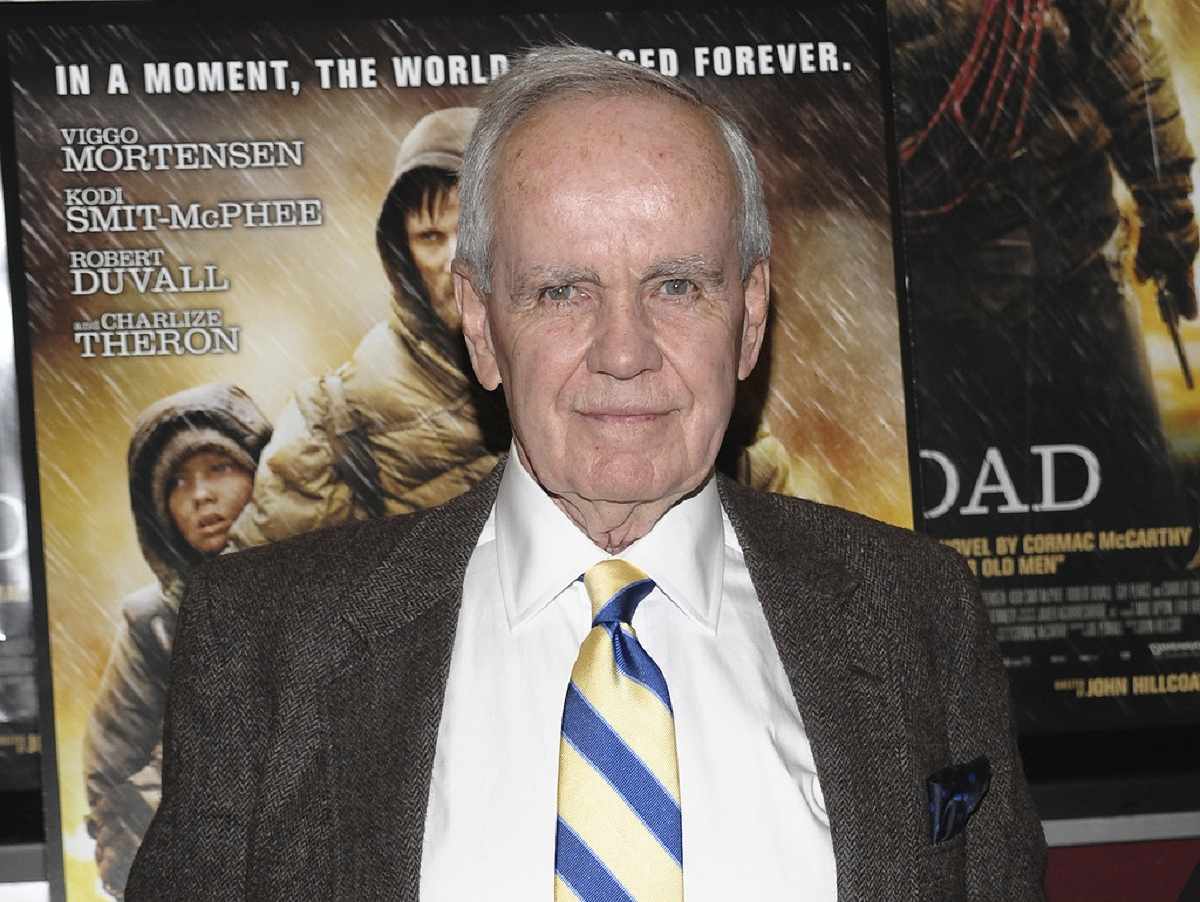
Author Cormac McCarthy attends the premiere of “The Road” in New York on Nov. 16, 2009.
10:52 JST, June 14, 2023
SANTA FE, N.M. (AP) — Cormac McCarthy, the Pulitzer Prize-winning novelist who in prose both dense and brittle took readers from the southern Appalachians to the desert Southwest in such novels as “The Road,” “Blood Meridian” and “All the Pretty Horses,” died Tuesday. He was 89.
Publisher Alfred A. Knopf, a Penguin Random House imprint, announced that McCarthy died of natural causes at his home in Santa Fe, New Mexico.
For 60 years, he demonstrated an unwavering dedication to his craft, and to exploring the infinite possibilities and power of the written word, Penguin Random House CEO Nihar Malaviya said in a statement. “Millions of readers around the world embraced his characters, his mythic themes, and the intimate emotional truths he laid bare on every page, in brilliant novels that will remain both timely and timeless, for generations to come.”
McCarthy, raised in Knoxville, Tennessee, was compared to William Faulkner for his expansive, Old Testament style and rural settings. McCarthy’s themes, like Faulkner’s, often were bleak and violent and dramatized how the past overwhelmed the present. Across stark and forbidding landscapes and rundown border communities, he placed drifters, thieves, prostitutes and old, broken men, all unable to escape fates determined for them well before they were born. As the doomed John Grady Cole of McCarthy’s celebrated “Border” trilogy would learn, dreams of a better life were only dreams, and falling in love an act of folly.
Every man’s death is a standing in for every other, McCarthy wrote in “Cities of the Plain,” the trilogy’s final book. “And since death comes to all there is no way to abate the fear of it except to love that man who stands for us.”
McCarthy’s own story was one of belated, and continuing, achievement and popularity. Little known to the public at age 60, he would become one of the country’s most honored and successful writers despite rarely talking to the press. He broke through commercially in 1992 with “All the Pretty Horses” and over the next 15 years won the National Book Award and the Pulitzer, was a guest on Oprah Winfrey’s show and saw his novel “No Country for Old Men” adapted by the Coen brothers into an Oscar-winning movie. Fans of the Coens would discover that the film’s terse, absurdist dialogue, so characteristic of the brothers’ work, was lifted straight from the novel.
The Road, his stark tale of a father and son who roam a ravaged landscape, brought him his widest audience and highest acclaim. It won the 2007 Pulitzer Prize for fiction and was selected by Winfrey for her book club. In his Winfrey interview, McCarthy said that while typically he didn’t know what generates the ideas for his books, he could trace “The Road” to a trip he took with his young son to El Paso, Texas, early in the decade. Standing at the window of a hotel in the middle of the night as his son slept nearby, he started to imagine what El Paso might look like 50 or 100 years in the future.
I just had this image of these fires up on the hill … and I thought a lot about my little boy, he said.
He told Winfrey he didn’t care how many people read “The Road.”
You would like for the people that would appreciate the book to read it. But, as far as many, many people reading it, so what? he said.
McCarthy dedicated the book to his son, John Francis, and said having a child as an older man “forces the world on you, and I think it’s a good thing.” The Pulitzer committee called his book “the profoundly moving story of a journey.”
It boldly imagines a future in which no hope remains, but in which the father and his son, ‘each the other’s world entire,’ are sustained by love, the citation read in part. “Awesome in the totality of its vision, it is an unflinching meditation on the worst and the best that we are capable of: ultimate destructiveness, desperate tenacity, and the tenderness that keeps two people alive in the face of total devastation.”
After “The Road,” little was heard from McCarthy over the next 15 years and his career was presumed over. But in 2022, Knopf made the startling announcement that it would release a pair of connected novels he had referred to in the past: “The Passenger” and “Stella Maris,” narratives about a brother and sister, mutually obsessed siblings, and the legacy of their father, a physicist who had worked on atomic technology. “Stella Maris” was notable, in part, because it centered on a female character, an acknowledged weakness of McCarthy’s.
I don’t pretend to understand women, he told Winfrey.
His first novel, “The Orchard Keeper” — written in Chicago while he was working as an auto mechanic — was published by Random House in 1965. His editor was Albert Erskine, Faulkner’s longtime editor.
Other novels include “Outer Dark,” published in 1968; “Child of God” in 1973; and “Suttree” in 1979. The violent “Blood Meridian,” about a group of bounty hunters along the Texas-Mexico border murdering Indians for their scalps, was published in 1985.
His “Border Trilogy” books were set in the Southwest along the border with Mexico: “All the Pretty Horses” (1992) — a National Book Award winner that was turned into a feature film; “The Crossing” (1994), and “Cities of the Plain” (1998).
McCarthy said he was always lucky. He recalled living in a shack in Tennessee and running out of toothpaste, then going out and finding a toothpaste sample in the mailbox.
That’s the way my life has been. Just when things were really, really bleak, something would happen, said McCarthy, who won a MacArthur Fellowship — one of the so-called “genius grants” — in 1981.
In 2009, Christie’s auction house sold the Olivetti typewriter he used while writing such novels as “The Road” and “No Country for Old Men” for $254,500. McCarthy, who bought the Olivetti for $50 in 1958 and used it until 2009, donated it so the proceeds could be used to benefit the Santa Fe Institute, a nonprofit interdisciplinary scientific research community. He once said he didn’t know any writers and preferred to hang out with scientists.
The Southwestern Writers Collection at Texas State University-San Marcos purchased his archives in 2008, including correspondence, notes, drafts, proofs of 11 novels, a draft of an unfinished novel and materials related to a play and four screenplays.
McCarthy attended the University of Tennessee for a year before joining the Air Force in 1953. He returned to the school from 1957 to 1959, but left before graduating. As an adult, he lived around the Great Smoky Mountains before moving West in the late 1970s, eventually settling in Santa Fe.
His Knoxville boyhood home, long abandoned and overgrown, was destroyed by fire in 2009.
"Society" POPULAR ARTICLE
-

M4.9 Earthquake Hits Tokyo, Neighboring Prefectures
-

M7.5 Earthquake Hits Northern Japan; Tsunami Waves Observed in Hokkaido, Aomori and Iwate Prefectures
-

Israeli Tourists Refused Accommodation at Hotel in Japan’s Nagano Pref., Prompting Protest by Israeli Embassy and Probe by Prefecture
-

Tsukiji Market Urges Tourists to Avoid Visiting in Year-End
-

M5.7 Earthquake Hits Japan’s Kumamoto Pref., Measuring Upper 5 Intensity, No Tsunami Expected
JN ACCESS RANKING
-

Keidanren Chairman Yoshinobu Tsutsui Visits Kashiwazaki-Kariwa Nuclear Power Plant; Inspects New Emergency Safety System
-

Imports of Rare Earths from China Facing Delays, May Be Caused by Deterioration of Japan-China Relations
-

University of Tokyo Professor Discusses Japanese Economic Security in Interview Ahead of Forum
-

Japan Pulls out of Vietnam Nuclear Project, Complicating Hanoi’s Power Plans
-

Govt Aims to Expand NISA Program Lineup, Abolish Age Restriction






















